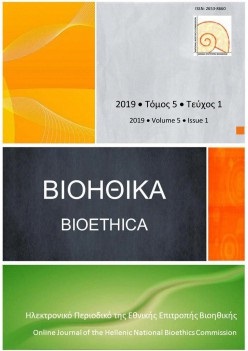Η βιοηθική στην εκπαίδευση
Аннотация
Τα τελευταία χρόνια τα ζητήματα βιοηθικής έχουν αποκτήσει μεγάλη σημασία καθώς έχει γίνει εμφανές ότι οι πολίτες όλων των ηλικιών θα κληθούν, σε κάποια φάση της ζωή τους, να λάβουν αποφάσεις με ηθικές προεκτάσεις σχετικά με τον τρόπο με τον οποίο χρησιμοποιούν την επιστήμη και την τεχνολογία. Οι έρευνες δείχνουν ότι υπάρχει παγκόσμια συμφωνία για την ανάγκη διδασκαλίας περισσότερων ηθικών και κοινωνικών θεμάτων που σχετίζονται με την επιστήμη και την τεχνολογία σε όλες τις βαθμίδες εκπαίδευσης.
Σε αυτό το άρθρο επιχειρείται αρχικά να διερευνηθούν, μέσα από την δημοσιευμένη βιβλιογραφία, η σημασία και ο ρόλος της βιοηθικής κυρίως στην δευτεροβάθμια και τριτοβάθμια εκπαίδευση. Εξετάζονται παραδείγματα προγραμμάτων σπουδών πρωτοβάθμιας και δευτεροβάθμιας εκπαίδευσης, οι στόχοι τους και η συμβολή τους στη βελτίωση της κατανόησης από τους μαθητές των διαφόρων πτυχών της βιοηθικής. Στη συνέχεια επιχειρείται μια ανασκόπηση της θέσης της βιοηθικής στην τριτοβάθμια εκπαίδευση. Αναλύονται οι διαφορετικές φιλοσοφίες προσέγγισης της βιοηθικής εκπαίδευσης και η σχέση της με τα ανθρώπινα δικαιώματα και ακολούθως συγκρίνονται τα πλεονεκτήματα και τα μειονεκτήματα των στρατηγικών διδασκαλίας της ενσωμάτωσης και της εξειδίκευσης.
Εν κατακλείδι, φαίνεται οτι βιοηθική εκπαίδευση αξίζει να συνδεθεί με άλλες επιστήμες και να ενσωματωθεί σε ένα ευρύτερο πλαίσιο ανάπτυξης δεξιοτήτων αποτελεσματικής και ενημερωμένης λήψης αποφάσεων είτε πρόκειται για επαγγελματίες υγείας είτε για τους πολίτες της συγχρονης κοινωνίας.
Article Details
- Как цитировать
-
Γλυκοφρύδη (Alexandra Glykofridi) Α., & Ζαπουνίδου (Maria Zapounidou) Μ. (2019). Η βιοηθική στην εκπαίδευση. Bioethica, 5(1), 13–29. https://doi.org/10.12681/bioeth.20833
- Выпуск
- Том 5 № 1 (2019): Bioethica
- Раздел
- Original Articles

Это произведение доступно по лицензии Creative Commons «Attribution» («Атрибуция») 4.0 Всемирная.
Authors who publish with this journal agree to the following terms:
- Authors retain copyright and grant the journal right of first publication with the work simultaneously licensed under a Creative Commons Attribution CC BY 4.0 License, which allows for immediate free access to the work and permits any user to read, download, copy, distribute, print, search, or link to the full texts of articles, crawl them for indexing, pass them as data to software, or use them for any other lawful purpose. Appropriate credit must be given by citing the author(s) and the original publication in this journal.
- Authors are able to enter into separate, additional contractual arrangements for the non-exclusive distribution of the journal's published version of the work (e.g. post it to an institutional repository or publish it in a book), with an acknowledgement of its initial publication in this journal.
We encourage authors to deposit their articles, as well as data underlying the publications, in institutional and/or other appropriate subject repositories.
Bioethica permits and encourages authors to archive the final publication pdf in institutional (e.g. the repository of the National Hellenic Research Foundation) or other appropriate subject repositories (e.g. SSOAR repository for social sciences), in compliance with institutional and/or funder open access policies, after publication in the BIOETHICA. Authors must provide bibliographic details that credit publication in the journal, as well as related funding details (when applicable).
Lists of institutional and other subject-based academic open access repositories can be found listed by country at the registry http://opendoar.org/countrylist.php
If your institution does not possess a repository you may deposit a copy of your paper at no cost with www.zenodo.org , the repository supported for open access research in the EU by the European Commission, through the project OpenAIRE (www.openaire.eu )



